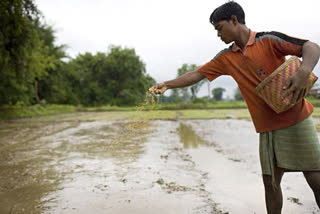Hyderabad: Our survival depends on agriculture and a good harvest depends on quality seeds delivered to India’s farmers by the organised seed sector - Public and Private. As we are amidst the coronavirus crisis, it is imperative that good seeds and other farm inputs reach farmers in time for Kharif season.
India needs about 250 lakh quintal of seeds for the Kharif season. The preparation of this seed happens between March and May. It begins from the farmers' fields, where pollination, etc are monitored by teams, and after harvest - drying, selection, the seeds are sent to processing plants for further processing, and then to labs for testing and finally are packaged before they are ready to send out to the farmers' fields.
This is a time taking process, and as it depends on nature, it cannot be shifted. The complete seed production eco-system is a complex system that requires help of allied sectors too, from transport to testing labs and packaging too, all have critical roles. And each of them has collectively failed to ward off the coronavirus blow.
Meanwhile, in a recent statement, the International Seed Federation (ISF) cited the European Food Safety Authority (EFSA), Center for Disease Control and Prevention (CDC), and the Bundesinstitut für Risikobewertung (BfR), saying that “there is currently no evidence that food including seed is a likely source or route of transmission of the virus. Transmission via surfaces which have recently been contaminated with the virus is, nonetheless, possible through smear infections."
Read:COVID-19: Impact on Mother India and her Children Abroad
However, this is only likely to occur during a short period after contamination, due to the relatively low stability of coronaviruses in the environment.”
To paraphrase, we have no evidence yet to say seeds are a gateway. But fear grows faster than COVID-19. The central and state governments’ have done a great job, to curb fear and quickly announced exemptions for the agriculture sector - seeds, labours, and other farm-related activities.
States like Telangana, UP among others have been very proactive. Special packages have also been announced for different sectors. The railways have been roped in to ease transport logistics. ICAR has also issued an agro-advisory to maintain hygiene and social distancing. But, all is not well in seed paradise.
Despite exemption orders, the seed and allied sectors are experiencing harassment and in some cases violence at the local levels. Seed hubs and production facilities are under pressure to shut and labours and local village level henchmen are using this opportunity to make unreasonable demands.
Vigilantes in certain areas are blocking roads and not allowing free movement of labour. The transport services are not allowed to open either, and the drivers themselves are harassed. Apart from higher wages, there is news of a higher percentage of inventory losses and rejections which is married with rising transport costs.
Within the seed sector, the overall cost of production has spiked up due to some of these factors and the small and medium companies are facing the brunt.
